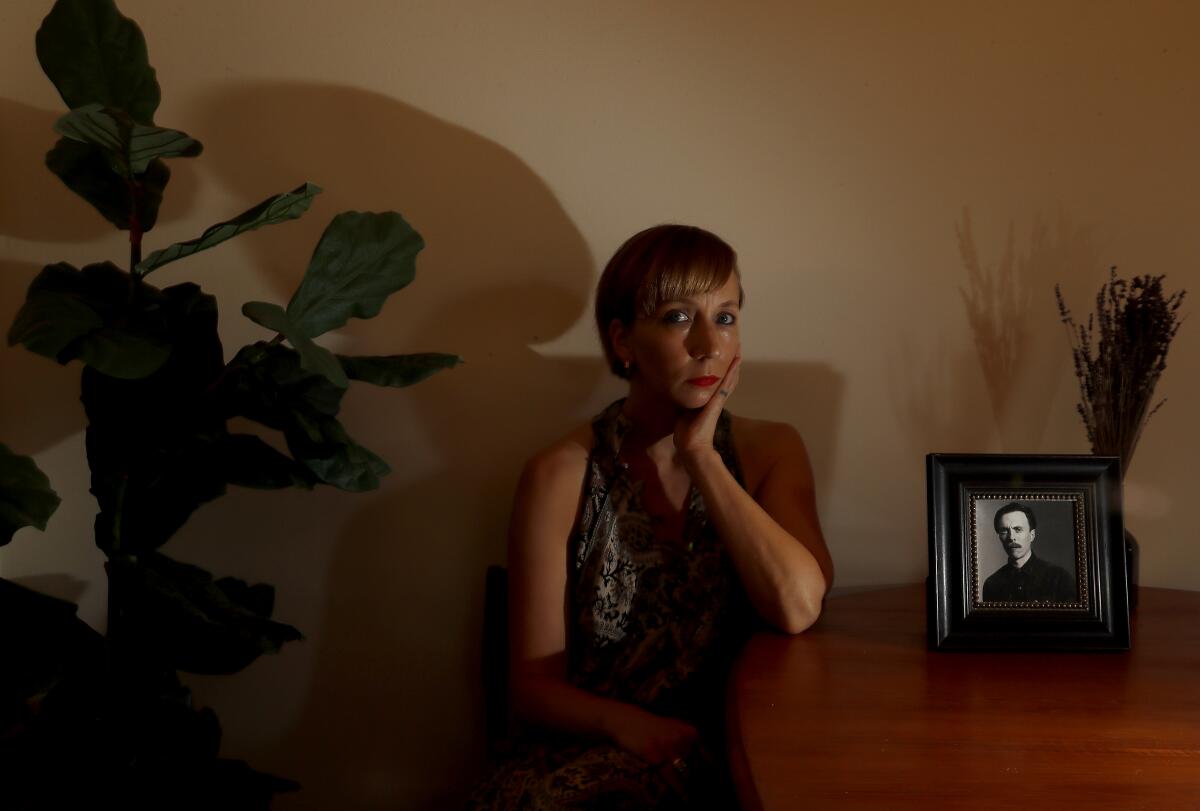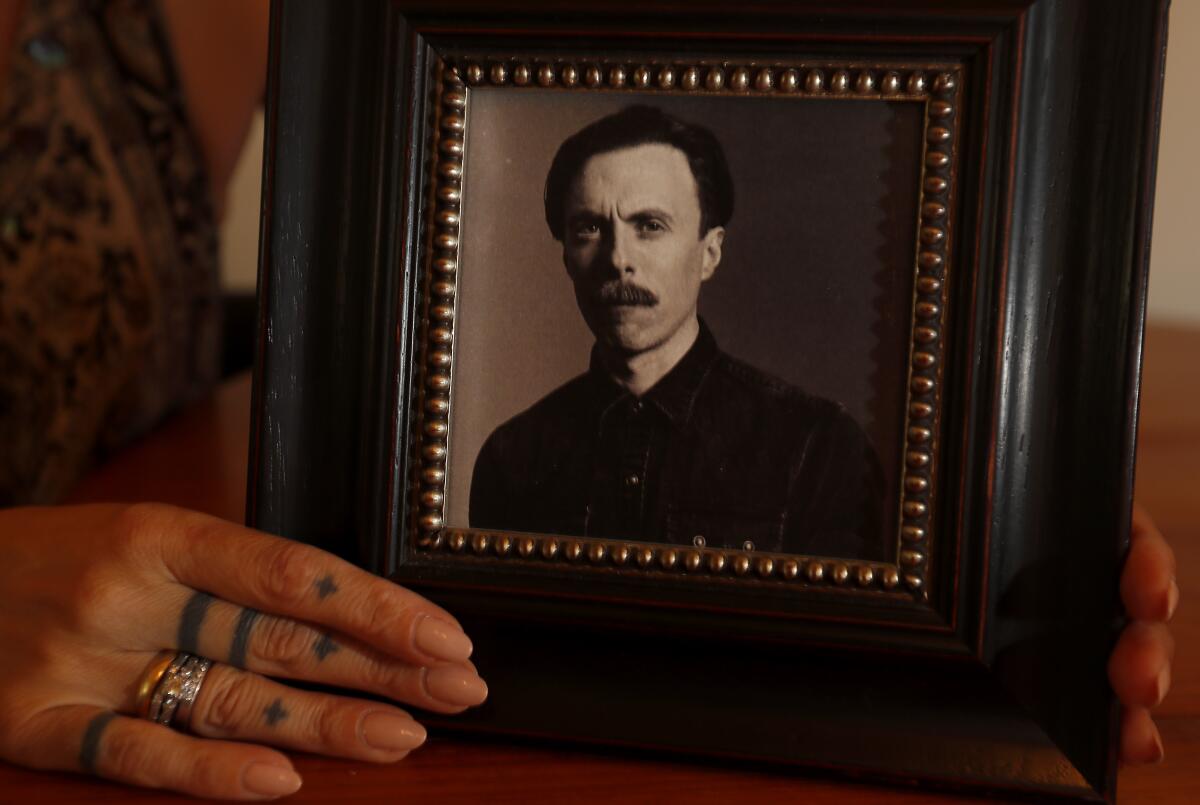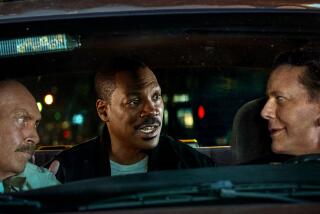An actor’s death was ruled an accidental drowning. His widow and private investigators suspect foul play

- Share via
Jason Murphy was flying high in September 2017.
The actor and improv artist had recently married his sweetheart. After returning from a honeymoon in Ireland, he’d attended a weeknight screening in North Hollywood of the movie “From Jennifer,” in which he has a scene-stealing part. Afterward, he stopped at a party with the cast and crew.
Hours later, Murphy, 34, would be found dead in the Los Angeles River in Elysian Park, northeast of downtown.
Authorities said Murphy accidentally drowned after a night of drinking. But his family and friends point to a host of unanswered questions suggesting that Murphy met a more violent end: His cellphone has never been found; he suffered bruising, cuts and other unexplained injuries; videos indicate he got off a Metro train two miles from his home; and some witnesses near where his body was found said they saw a man running in fear that night.
His widow, Dina Gregg, and several retired homicide detectives she has hired accuse the Los Angeles Police Department of botching the investigation. No Northeast Division homicide detectives went to the scene, and they ignored evidence that might point to Murphy being robbed and killed, Gregg and her investigators said.
Gregg has repeatedly pestered the LAPD to reopen the case and says it’s unfair that she’s had to raise tens of thousands of dollars online to hire private investigators to help find clues about Murphy’s death.
“I want the LAPD to seriously investigate this,” Gregg said. “I want justice for my husband.”
Adam Bercovici, a retired LAPD lieutenant whose posts included the heralded Robbery-Homicide Division and the Special Investigative Section, said investigators failed to perform basic police work, such as visiting the scene to interview witnesses. He also said coroner’s investigators should have done a more thorough forensic investigation.
“This was a failure from the onset,” Bercovici said. “None of this was done right. The LAPD does a lot of good work, but not in this case.”
Now, robbery-homicide detectives are “conducting a biopsy” of the Northeast Division investigation, and “if deficiencies are identified, they will follow up on any and all investigative clues,” said Deputy Chief Robert Green, the chief of staff for Chief Michel Moore.
“When there are questions by anyone about the quality of one of our investigations, the concerns are taken seriously,” Green said in a statement. “In an effort to ensure we are providing the highest level of service, an outside, independent entity, in this case RHD, is asked to conduct a biopsy of the area’s investigation to assess its quality.”
He reiterated that the LAPD was searching for answers, adding: “Detectives are currently reviewing all the evidence in the investigation,and it is too early to determine the outcome.”
Northeast Capt. Arturo Sandoval did not respond to a request for comment.
Murphy moved to Los Angeles from Texas more than 15 years ago and fell in love with the city, Gregg said. The pair began dating in December 2013 and married three years later. He appeared in television commercials, including some for fast-food chains and auto insurance. He also performed at numerous comedy clubs. Although he had a small frame, Murphy had a buoyant, large personality, Gregg said. Meeting new people enthralled him.
He had never been happier, Gregg said.

On Sept. 19, 2017, Gregg dropped Murphy off at the movie screening and planned to go to sleep before he returned home. She recalled that, as Murphy exited the car, he said he would walk the dogs when he got back.
When Gregg awoke at 6:40 a.m., Murphy wasn’t in bed or in their house in the Frogtown neighborhood, which abuts the L.A. River. She worried as minutes passed. She called and texted people who had attended the movie event, where there was a two-drink limit. Murphy, they told her, headed home after having two drinks.
Gregg tried but failed to locate Murphy’s phone on her computer. She repeatedly called him but kept getting voicemail. A short time later, her phone rang. Murphy’s mother, Suzanne York, was calling from Texas, which Gregg thought was unusual. She asked if Gregg was sitting.
“There had to be a logical explanation for the call,” Gregg thought. “It was a very brief phone call. My mother-in-law told me my husband was dead. I was in complete shock.”
A man driving his truck in the river found Murphy’s body in an industrial area near Figueroa Street and Avenue 19. He went to the Northeast Division and guided officers to the body, according to the autopsy report. The location was bordered by concrete walls with chain-link fences and railroad tracks.
The Los Angeles County coroner ruled the death an accidental drowning, with alcohol intoxication a contributing factor. In the hours after Murphy’s death, Gregg told a coroner’s investigator that her husband “sometimes blacks out from the alcohol consumption.”
The coroner’s report, which Bercovici provided to The Times, said Murphy was found in 3 inches of water at the bottom of a 33-foot wall. A medical examination found abrasions and contusions on his forehead, face, thighs, knees and foot. The exam also found a black eye and multiple cuts on his hand, which seemed consistent with contact with barbed wire. He also had a herniated diaphragm and a blood-alcohol concentration of 0.23%, the report said.
“A possible proposed scenario was that Mr. Murphy was pushed or dropped from the top of the wall or the road above, but the lack of significant trauma is not supportive of this scenario,” the report said, adding: “The manner of death is accident.”
Sarah Ardalani, a coroner’s spokeswoman, said the office was confident in its findings and declined to comment further.
Gregg learned that when Murphy’s body was found, he still had his wallet, containing $200 and credit cards, and his wedding ring. His cellphone was the only thing missing. At that instant, Gregg recalled, she started to grow suspicious.
It didn’t take long, Gregg said, before she felt that Northeast Division homicide investigators were not taking the case seriously. Gregg said she had to make repeated phone calls or send multiple emails to obtain information. It took investigators three months before they interviewed anyone who attended the film screening, Gregg contends.
Gregg said she constantly asked investigators to pull surveillance video from Metro stations and trains to learn if Murphy had ridden one toward his home. Based on where Murphy was found, Gregg speculated he rode a Gold Line train to the Lincoln-Cypress station. But she didn’t have proof.
After retrieving Murphy’s wallet from the coroner, she found transit passes indicating he had entered and exited several Metro trains. A relative went to Metro headquarters and learned that Murphy rode a train from North Hollywood to Union Station and then to the Lincoln-Cypress station about two miles from their home. Authorities retrieved the video but warned it might upset her.
Detectives said the video showed her husband with another woman. Gregg refused to believe it. She was appalled when she finally saw it — it was an unknown couple who were recorded on a different day. “Get the right footage,” Gregg recalled telling authorities.
For several months, while Gregg concentrated on the missing cellphone, detectives were focused on the alcohol Murphy had in his system. The detectives, she said, kept saying the case was a death investigation, not a homicide.
“This was already a horror movie,” Gregg said. “The people I thought were helping me were not helping me.”
In April 2019, Bercovici, who owns an investigative firm, agreed to investigate the death with retired homicide Dets. Robert Jakucs and Armando Romero. Two other team members included Doreen Hudson, former commanding officer of the LAPD’s Forensic Science Division, and John Cencich, director of the Pennsylvania Center for Investigative and Forensic Sciences at California University of Pennsylvania.
Bercovici said he took no joy in criticizing his former employer of 30 years. But nobody, he added, should have to fight to get answers from police about a loved one’s death.
He contends Murphy’s injuries should have been a red flag that foul play could have occurred. Additionally, he said, Murphy wasn’t homeless or a transient like others who cluster near the area where a bystander found the body.
More important, Bercovici said, it’s basic police work for homicide investigators to scour scenes for witnesses and evidence, but the Northeast Division watch commander didn’t dispatch them. He noted that video footage from a freelance photographer showed only patrol officers and paramedics at the scene, standing over Murphy in several inches of water.
Once Bercovici’s team took the case, the retired investigators interviewed the crew and cast from the movie screening and people in homeless encampments close to where Murphy was found.
Several bystanders said they remembered a man running and flailing his arms the night Murphy died, Bercovici said. He speculated Murphy might have been trying to ward off someone who wanted to steal his phone. The possible witness, he said, feared talking to police because of the presence of gangs in the area.
He called the missing cellphone a key piece of evidence and faulted the LAPD for not seeking data from Murphy’s phone cellular carrier. The carrier stores data for only a year, he said.
“They have a unit dedicated to that,” Bercovici said. “They lost everything. It’s too late now.”
He said he was glad the Robbery-Homicide Division was examining the case but warned Gregg that the circumstances surrounding Murphy’s death could remain a mystery. Still, Gregg said she wouldn’t rest until she learned how her husband received his injuries and landed in the river.
“I believe he was attacked and left to drown that night,” Gregg said. “I’m convinced there was foul play.”
More to Read
Sign up for Essential California
The most important California stories and recommendations in your inbox every morning.
You may occasionally receive promotional content from the Los Angeles Times.














